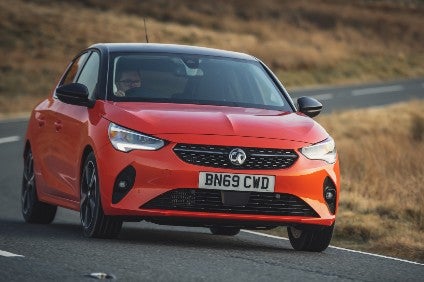
New car sales in the UK were down almost 40% in January as showroom closures due to population lockdowns stifled demand.
According to SMMT data, just 90,249 new cars were registered in January – the worst start to a year since 1970 despite click and collect preventing greater fall.

Discover B2B Marketing That Performs
Combine business intelligence and editorial excellence to reach engaged professionals across 36 leading media platforms.
Demand remained depressed for both private buyers (-38.5%) and large fleets (-39.7%). Declines were also recorded in both petrol and diesel cars registrations, which fell by 62.1% and 50.6% respectively.
On a positive note, battery electric vehicle (BEV) sales grew by 2,206 units (54.4%) in the month to take 6.9% of the market, as the number of available models almost doubled from 22 in January 2019 to 40 this year. Combined, BEVs and plug-in hybrid vehicles (PHEVs) accounted for 13.7% of new car registrations.
With lockdown restrictions in place until March – the most important month of the year for the sector, accounting for one in five new car registrations on average – the industry will face a challenging year as showroom closures depress consumer demand, which has a knock-on effect on manufacturing output. Opening dealerships as soon as it is safe to do so would help re-energise consumer confidence, supporting jobs and a green recovery.
The effect of the current lockdown can be seen in SMMT’s latest market outlook. Having expected more than two million new cars to be registered in 2021, the SMMT forecast has now been downgraded to below 1.9 million given the more severe negative impact on first quarter performance and March in particular.
The forecast does represent an increase of 15.7% compared to 2020’s ‘lost year’ but it would still be a very subdued market in historical terms, given the 10-year average new car market to 2019 was 2.3 million.
More positively, however, BEVs and PHEVs are estimated to grow their combined market share from just over one in 10 new cars, to more than one in seven.
Such growth in ultra low emission vehicles would continue the trend seen in 2020. Latest SMMT analysis shows that 2020 recorded the largest ever fall in average car CO2 emissions, spurred on by increased uptake of BEV, PHEV and hybrid electric vehicles (HEVs) which accounted for almost one in six new car registrations.
In fact, more than half of all BEVs registered in the past two decades were registered in 2020 alone. Combined with ongoing improvements to petrol and diesel engines, average vehicle CO2 dropped to 112.8g/km – a reduction of 11.8% compared to 2019 and 37.7% compared to 2000.
The SMMT said there ‘can be no let-up in the pace of environmental improvement, however, as the industry must achieve a UK-only CO2 fleet average target of 95g/km this year or face severe penalties’. This, the SMMT said, underscores the need to get showrooms open as soon as Britain emerges from lockdown, so they can generate the demand required to reach the country’s green goals.
Mike Hawes, SMMT Chief Executive, said: “Following a £20.4 billion loss of revenue last year, the auto industry faces a difficult start to 2021. The necessary lockdown will challenge society, the economy and our industry’s ability to move quickly towards our ambitious environmental goals. Lifting the shutters will secure jobs, stimulate the essential demand that supports our manufacturing, and will enable us to forge ahead on the Road to Zero. Every day that showrooms can safely open will matter, especially with the critical month of March looming.”
The Vauxhall Corsa was January’s top selling model.
Top 10 sellers
- 1. Vauxhall Corsa (3,078)
- 2. Kia Sportage (2,986)
- 3. Nissan Qashqai (2,835)
- 4. Ford Fiesta (2,594)
- 5. Volvo XC40 (2,201)
- 6. Mercedes A-Class (1,859)
- 7. VW Golf (1,779)
- 8. Ford Puma (1,760)
- 9. Kia Niro (1,741)
- 10. Ford Focus (1,686)
BEV – Battery Electric Vehicle; PHEV – Plug-in Hybrid Electric Vehicle; HEV – Hybrid Electric Vehicle; MHEV – Mild Hybrid Electric Vehicle






